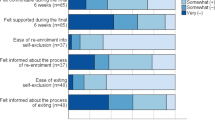Abstract
Problem gambling is a global concern, and behavior analytic attention has increasingly focused on reasons for why problem gambling occurs and conditions under which it is maintained. However, limited knowledge currently exists on the process to which self-generated rules maintain gambling behaviors. Therefore, the current study assessed six recreational gamblers on a roulette game before and after discrimination training to establish a self-rule to wager on red or black. Following discrimination training, all six participants altered their response allocation among red or black and consistently responded according to the newly derived self-rule. Results maintained during 1-week follow-up sessions across all participants. Implications for clinical application of self-awareness and self-generated rule following are discussed.
Implications for practice
• Demonstration of how stimuli such as color can alter gambling behavior
• Procedures to assist clients with changing self-rules about gambling behavior
• Using self-generated rule formulation for more contextually appropriate target behaviors
• Highlights how self-generated rules can be altered to change clinical target behaviors


Similar content being viewed by others
References
Dixon, M. R., Nastally, B. L., Jackson, J. E., & Habib, R. (2009). Altering the near-miss effect in slot machine gamblers. Journal of Applied Behavior Analysis, 42(4), 913–918.
Dixon, M. R., Wilson, A. N., & Whiting, S. W. (2012). A preliminary investigation of relational network influence on horse-track betting. Analysis of Gambling Behavior, 6(1), 23–36.
Dymond, S., & Roche, B. (2010). The impact of derived relational responding on gambling behavior. Analysis of Gambling Behavior, 1(4), 38–53.
Guercio, J. M., Johnson, T., & Dixon, M. R. (2012). Behavioral treatment for pathological gambling in persons with acquired brain injury. Journal of Applied Behavior Analysis, 45(3), 485–495.
Hoon, A., Dymond, S., Jackson, J. W., & Dixon, M. R. (2008). Contextual control of slot-machine gambling: replication and extension. Journal of Applied Behavior Analysis, 41, 467–470.
Lesieur, H. R., & Blume, S. B. (1987). The South Oaks Gambling Screen (SOGS): a new instrument for the identification of pathological gamblers. American Journal of Psychiatry, 144(9), 1184–1188.
Nastally, B. L., Dixon, M. R., & Jackson, J. W. (2010). Manipulating slot machine preference in problem gamblers through contextual control. Journal of applied behavior analysis, 43(1), 125–129.
Weatherly, J. N., & Dixon, M. R. (2007). Toward an integrative behavioral model of gambling. Analysis of Gambling Behavior, 1(1), 4–18.
Wilson, A. N., & Dixon, M. R. (2014). Derived rule tacting and subsequent following by slot machine players. The Psychological Record, 1–9. doi:10.1007/s40732-014-0070-7.
Witts, B. N. (2013). Cumulative frequencies of behavior analytic journal publications related to human research on gambling. Analysis of Gambling Behavior, 2(7), 59–65.
Zlomke, K. R., & Dixon, M. R. (2006). Modification of slot-machine preferences through the use of a conditional discrimination paradigm. Journal of Applied Behavior Analysis, 39, 351–361.
Author information
Authors and Affiliations
Corresponding author
Rights and permissions
About this article
Cite this article
Wilson, A.N., Grant, T. Implications of Derived Rule Following of Roulette Gambling for Clinical Practice. Behav Analysis Practice 8, 52–56 (2015). https://doi.org/10.1007/s40617-014-0029-9
Published:
Issue Date:
DOI: https://doi.org/10.1007/s40617-014-0029-9




